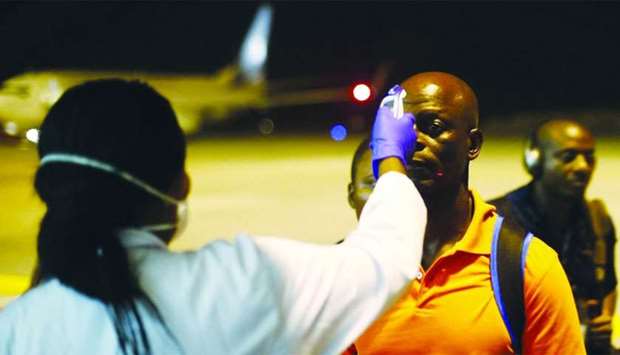The World Health Organisation (WHO) recently sounded the highest alarm over Ebola, a highly contagious disease, which has already killed more than 1,600 people in the Democratic Republic of Congo, a Central African country.
Given the importance of travel and tourism to the global economy, accounting for 10% of global GDP and 1 in 10 jobs on the planet; the impact of a health emergency goes beyond the health of citizens to include the health of the local and the interconnected global economy.
As such, there is a need for co-operation of all concerned to ensure that all affected stakeholders have access to timely and accurate information to allow for efficient and optimal decision-making, points out the World Travel and Tourism Council (WTTC).
“The scale and longevity of the impact of Ebola on travel and tourism is significant when compared to other epidemics, reflecting the duration of the epidemic and the period over which the borders were closed and flights were frozen,” WTTC said in a report on the Ebola impact on global travel and tourism industry.
The West Africa Ebola epidemic, which had its first reported case in December 2013, lasted two-and-a-half years, affecting almost 30,000 people, WTTC noted.
Almost 99% cases were in Guinea, Sierra Leone and Liberia. The majority of airlines froze flight routes and a number of neighbouring countries closed their borders with the affected country, including Senegal and Côte D’Ivoire.
Countries began to re-open their borders in January/February 2015, and as late as September 2016 in the case of Côte D’Ivoire, WTTC said.
The impact of Ebola on travel and tourism was immediate for Sierra Leone, with tourist arrivals down by 50% from 2013 to 2014. To date, neither arrivals nor spending from international visitors have yet returned to their pre-epidemic peak, with inbound arrivals from Western markets hit hardest.
According to WTTC, the resulting “loss” of direct travel and tourism GDP is equivalent to 0.9% and 1.6% of whole economy GDP in Guinea and Sierra Leone respectively. GDP in Sierra Leone slowed from a 10-year average growth rate of 7.8%, to 4.6% in 2014.
The economy in Guinea almost came to a halt over the same two-year period.
Countries as far away as Kenya, more than 3,000 miles from the outbreak, reported a significant loss in arrivals during the period, citing travel fears over Ebola among other factors, the report noted.
In today’s increasingly complex and interconnected global landscape, co-ordination and co-operation are a ‘must have’, especially when it comes to global security.
The same principles apply to communication, whereby technologies from mobile to social media have enabled tweets, advisories and messages to go around the world in a matter of seconds.
Given that cancelled trips to affected destinations is often the immediate response to a crisis such as Ebola epidemic, it is essential that those decisions that affect economies and livelihoods are made with fairness rather than as a result of any sensationalised messaging or fear.
The global trade body of airlines, IATA, said it is co-ordinating closely with the WHO and the International Civil Aviation Organisation (ICAO) with respect to potential implications for air connectivity.
WHO's current risk assessment for travel and transport does not mandate any travel restrictions or the closure of borders at points of entry.
On the contrary, in a recent statement, its Emergency Committee explicitly said, “No country should close its borders or place any restrictions on travel and trade. Such measures are usually implemented out of fear and have no basis in science. They push the movement of people and goods to informal border crossings that are not monitored, thus increasing the chances of the spread of disease.
“Most critically, these restrictions can also compromise local economies and negatively affect response operations from a security and logistics perspective. National authorities should work with airlines and other transport and tourism industries to ensure that they do not exceed WHO’s advice on international traffic.
It does not see any necessity for entry screening at airports or other ports of entry outside the region as of now.
In line with WHO guidance, awareness campaigns are being conducted for travellers to and from the affected region.
As always, passengers are advised not to travel if they are unwell. And any traveller developing symptoms of the Ebola within three weeks of returning from an affected region is advised to seek rapid medical attention.
Health experts say the Ebola virus is not transmitted through air, but by contact with bodily fluids and is contagious only once there are symptoms such as fever, vomiting and diarrhoea. These symptoms are so crippling that it is nearly impossible for anyone suffering them to board a plane.
The World Health Organisation stated that the risk of Ebola spreading outside the affected region (in Central Africa) was not high.
As of now, flying is not restricted to the Ebola-hit countries and Africa at large.
That said, WHO has already sounded a global alert on Ebola. So it is time the world took notice.
* Pratap John is Business Editor at Gulf Times.


